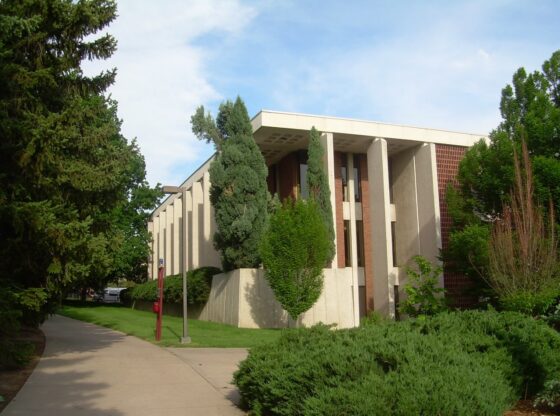DU professors recently received a two page internal newsletter email from Provost Gregg Kvistad regarding the implementation of Friday classes starting winter quarter of the 2014-15 academic year for departments that do not currently require them. The decision was reached in part to boost the academic prestige of campus and in part to help curb student alcohol abuse, which the letter, dated May 7, states has lead to increased incidents of sexual assault.
The email newsletter sent to DU faculty expressed concern about the emptiness of campus on Fridays and how it might hurt the reputation of the school.
“ … On Fridays there are broad swaths of the DU campus with very few signs of life – any life, let alone a vibrant and intense academic community with people coming and going from classes, lectures or the myriad other activities we engage in during the rest of the week,” states Kvistad in the email. “It is a peculiar message that the University is transmitting, and it is sent by large segments of the University not holding undergraduate classes on Fridays. The result is, in short, a significant level of intellectual disengagement among our students for three of the seven days of the week and, in turn, a weakening of the University’s academic culture.”
Approximately 74 percent of DU undergraduates do not have class on Fridays, according to the newsletter. Students with majors in the schools of Arts, Humanities and Social Sciences, Daniels College of Business or the Josef Korbel School of International Studies do not typically have Friday classes, while those who are a part of the schools of Natural Sciences and Mathematics or the Ritchie School of Engineering and Computer Science typically do. The end goal, according to the email, is to implement Friday classes for all departments across the university.
The newsletter also addressed the fact that not holding classes on Friday is a practice in some departments, but not a university policy. It clarified that the university policy will not be changed, but discussion with deans on campus revealed support for holding undergraduate classes on Fridays.
One of the main factors behind this decision is the recommendations of the Alcohol Coalition, headed by Alan Kent, executive director of the Health and Counseling Center (HCC). The coalition’s main duty is to study and address high-risk substance abuse amongst undergraduates at DU.
“The coalition submitted a report a few weeks ago with ten different recommendations, including ‘the expansion of Friday classes and other measures to enhance and sustain academic rigor throughout the academic term,’” said Kvistad in an email conversation “The report was one piece of evidence used by the deans and me to decide to implement the practice of a full Friday class schedule.”
Logan Bohlender, the lone student representative from the coalition, believes that although this new rule is trying to protect students, it shows a disconnect between the university and its students.
“The decision for Friday classes was made in good conscience, but it shows a huge disconnect between the university and its students and enforces a DU administration versus students’ mentality.”
Some students responded by starting a petition on Change.org, which had more than 400 signatures as of May 19.
“Students rely on Fridays as a source of free time for a number of things such as: leisure, work, exercise, chores and enjoying the many activities our beautiful school and state offer to us,” states the petition. “Forcing students into the classroom on Fridays will not only lead to no change in the pattern of alcohol consumption on Thursdays, but will result in the increased consumption of alcohol on Fridays and a decrease in the overall well being of your students.”
Sarah Belstock, program director and leader of health promotion for the HCC, was part of the coalition and hopes students will work for respect amongst the administration.
“I also hope to work with student leaders to support the development of a Student ‘Town Hall’ this fall,” said Belstock. “It is our desire that this would provide a forum for students to share their perspectives related to alcohol use on campus and their thoughts on what we can do, as a campus, to keep our community safe.”
The newsletter sent to the faculty presented statistics behind the committee’s recommendation and behind the need for community safety. It reported that this year, 52 percent of first-year students at DU self-reported as light/moderate drinkers, which is 24 percent higher than the national average of 32 percent. There was also an increase in students taken to detox compared to previous years; this year, in the fall and winter quarters, there were 98 students taken to detox, compared with 90 students in 2012-2013. Also, 13 percent of DU students reported being sexually assaulted in a study that spanned the length of two weeks. During this time, eight percent of DU students reported to have taken advantage of someone sexually.
It is hoped that the implementation of more Friday classes would help address these issues.
According to Kvistad, there have been no formal complaints about the implementation of Friday classes, and he has experienced only support from faculty members, administrators and trustees. However, some professors have expressed concerns about how the change will affect their schedules and personal lives.
Michael Monahan, senior lecturer for the Department of Biological Sciences, likes the current format and believes it is the best for his teaching.
“I like the hour and a half format to allow for in-depth treatment of topics. It gives me more flexibility in terms of writing assignments I wish to do in class,” states Monahan. “I also find it helpful to have my Friday for recovery and completion of grading assignments and that sort of thing, so for me it is a day to turn to other responsibilities without concern for exam or lecture preparation. I appreciate that efficiency and space use is a concern and this may well be something that needs to be addressed from an economic perspective but from the standpoint of my teaching duties, I prefer the format I already have.”
Currently, there is a committee of faculty members and administrators, chaired by University Registrar Dennis Becker, that is investigating scheduling options and an implementation timeline, according to Kvistad. As of right now, the administration does not know the specifics of the form this new schedule will take.











